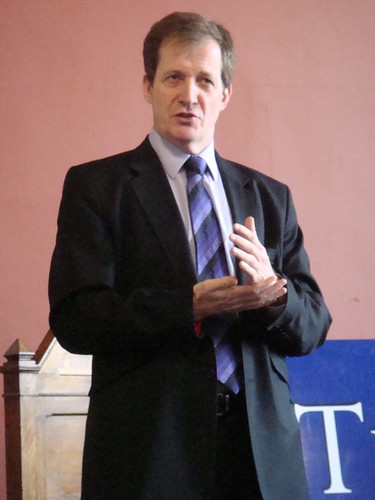Alastair Campbell was once introduced by an interviewer as ‘the most evil man in Britain’, to which he sharply retorted ‘I job share with Peter Mandleson’. For those of you unaware, Alastair Campbell is a British journalist, broadcaster, political aide and author, but is best known for his work as Director of Communications and Strategy for Prime Minister Tony Blair between 1997 and 2003. He is also (in)famously outspoken and possesses the kind of Jack-the-lad persona and stinging wit that makes him stand out in the constant grey arena of politics. The Hist clearly have a character on their hands this Tuesday morn.

Alastair Campbell, never muted.
The Media
Opening up his thirty-minute speech, Mr. Campbell immediately manifests his frustration with the media, a topic that he consistently returns to throughout. “We live in a media age, media is all hours, all of the time.” According to Campbell the increase in media outlets as well as the number of people using them has changed both the media and journalism profoundly. “I have a friend in the film industry and he said to me that before if you have a big film with a big budget, big stars, posters on buses… you were guaranteed three big paydays: the Friday, Saturday and the Sunday. Now, however, there’s just one: the Friday. People tweet, go on Facebook. These kinds of things are now far more important than reviews.” The decline in journalistic quality is what truly aggrieves him though. “The standards in journalism have been declining anyway. The line of who is and isn’t a journalist is being constantly blurred.”
Campbell goes on to discuss the role of the media in politics and his own experiences in dealing with what he saw as being “a culture of negativity”. He believes that the journalists view themselves as being more important than “the policy makers” and that “newspapers have become players rather than spectators.” Mr. Campbell is more aware of how scrutinizing and unrelenting the media can be than most, he was, after all, “the person they saw more than anyone else.” Begrudgingly though he realises that the media are extremely necessary and that “there are only limited means to connect with the public and the main one is the media.”
Politics
Alastair Campbell’s own political ideology is very much in line with Labour and he has been a loyal servant to the party over the past 3 decades. He is wary though of how the negative images portrayed by the media will affect politics in the future. “Don’t be surpised if no one wants to enter into politics” he warns and he explains that “what the public yearn for is deeper engagement, something that will only change if the mainstream media realize that they are part of this”. If things stay the way they are the idea that politicians deserve no respect will persist. There are numerous occasions during the course of his speech that Campbell indeed compliments politicians, describing politics as being “a noble calling.” He uses Northern Ireland to illustrate how a good political backbone can transform a social landscape, where pressing concerns change from “bombs and hatred to agriculture and health.” Mr. Campbell describes the pressure faced by politicians as being “relentless, the scope of their decisions can affect millions of people across the globe.” What is most peculiar about Alastair Campbell’s career, as he will testify himself, is that he has worked at the top level of both the media and politics and as his opinion of the media declined, his respect for politics rose.
Cause Célèbre
The reason we are all here, however, in most cases skipping lectures, is for the few snippets of controversy that seem to perpetually follow Alastair Campbell. Perhaps ‘controversy’ is the wrong way of putting it, in truth he is merely an intelligent, opinionated man who has no fear of making those opinions know. As his speech comes to a close, the floor is opened to the audience and the themes of questions range from David Cameron to Wikileaks. On the former, Campbell was more grating, describing Labour’s 2010 electoral opponent as having “little empathy, he doesn’t understand people, he doesn’t have a sense of what he wants to do in power, his background is disproportionate to the population.” Harsh words, but perhaps truth can be drawn given the fact the Tories failed to win an overall majority even though, in Campbell’s own words, “Britain needed a change.”
On the latter, Wikileaks, Mr. Campbell is more elusive on which side he favours. He states that in principle he’s “all for the freedom of information, yet it only works if the media acts responsibly too.” One of Tony Blair’s main regrets was the over-saturation of transparency and “the waste of money from quangos to answer trivial questions.” Another negative element of the leaks in ‘cables’ is the break down of trust in foreign relations, and Mr. Campbell uses his experiences in Northern Ireland to portray this: “sometimes to keep Unionists on board we would have to say something different to them than the other side. If we were exposed at any time it would have caused a real difficulty. Is this misleading? Well not really, we were just taking different angles on the same truth. The problem with Wikileaks is that it has made it harder for diplomats to do the really difficult the right thing.” And with a quick thank you, so ends the morning’s speech. Alastair Campbell, ever contentious, ever entertaining.







